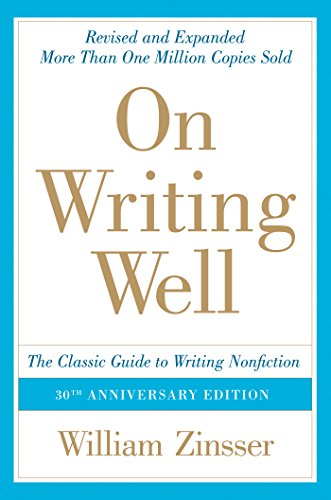My Top 5 Takeaways from On Writing Well by William Zinsser
“Can you recommend a book for . . .?”
“What are you reading right now?”
“What are your favorite books?”
I get asked those types of questions a lot, which is why once a month I share a book that I’ve particularly liked, why I liked it, and several of my key takeaways.
This month’s pick is On Writing Well by William Zinsser, which is one of my absolute favorite books on the art and craft of, well, writing well.
If you’ve already read a book that I recommend or have a recommendation of your own to share, drop a comment down below and let me—and the rest of us “book clubbers”—know!
(And if you want to be notified when new recommendations go live, hop on my email list and you’ll get each new installment delivered directly to your inbox.)
My 5 Key Takeaways from On Writing Well by William Zinsser
1
“Look for the clutter in your writing and prune it ruthlessly. Be grateful for everything you can throw away. Reexamine each sentence you put on paper.”
My Note
Great writing is always the result of ruthless rewriting—of reviewing every word to ensure it’s doing new work and every sentence, passage, and paragraph to find tighter ways to communicate your thoughts and to shed language that’s faddish and frilly.
So always collect and create more material than you’ll use. This way, you’ll have a surplus of work to choose from, allowing you to select only that which will best serve your needs.
2
“Readers want the person who is talking to them to sound genuine. Therefore a fundamental rule is: be yourself.”
My Note
The most valuable commodity you have as a writer is you—your wholly unique combination of experiences, observations, attitudes, feelings, and ideas; your “voice.” Therefore, you should always write with that voice regardless of the topic and always look to amplify rather than stifle it.
3
“You’ll never make your mark as a writer unless you develop a respect for words and a curiosity about their shades of meaning that is almost obsessive.”
My Note
The hack merely rents and returns lumps of language without even processing them, like they’re from Taco Bell, but the accomplished writer treats words in the same way as the certified sommelier treats grapes and the bespoke shoemaker treats leather—as precious gifts.
The masterful writer collects strong words, curious words, silly words, funny words, surprising words, lucid words—words, words, and more words. The hunt for the right words is fetishistic and the quality of the discoveries is its own reward.
4
“Such considerations of sound and rhythm should go into everything you write. If all your sentences move at the same plodding gait, which even you recognize as deadly but don’t know how to cure, read them aloud. (I write entirely by ear and read everything aloud before letting it go out into the world.) You’ll begin to hear where the trouble lies.”
My Note
Two of the simplest ways to immediately improve your writing are:
- Put it away for at least 24 hours before reviewing it again. Then repeat this as many times as you can bear.
- Read it aloud each time you review it.
Trust me. Try it. You’ll never look back.
5
“Writing is thinking on paper. Anyone who thinks clearly can write clearly, about anything at all.”
My Note
If you want to be a better researcher, studier, learner, or thinker, you want to incorporate writing into those activities because contrary to what many people think, writing isn’t merely a way to record the results of research, study, learning, or thinking—it’s a medium of all that work.
Most people think of those things as purely internal processes and writing only as a way to document finished thoughts. The fabled physicist Richard Feynman would disagree.
He was once interviewed by a historian who spotted Feynman’s notebooks and said how pleased he was to see there were “wonderful records of Feynman’s thinking.” Feynman corrected him. “They aren’t a record of my thinking process. They are my thinking process. I actually did the work on the paper.”
The historian didn’t get it. “Well,” he said, “the work was done in your head, but the record of it is still here.”
“No, it’s not a record, not really,” Feynman replied. “It’s working. You have to work on paper, and this is the paper.”
Learn to write clearly and fluently, and you’ll learn to think clearly and fluently. In fact, it’s basically impossible to develop deep and rich understandings and reach new and intriguing insights without doing a lot of writing, because while our minds are fantastic at spotting similarities, dissimilarities, and patterns, they’re comparatively awful at accessing and surveying large landscapes of information.
Writing allows us to externalize information, however, which in turn allows our mind to focus on what it’s best at (analyzing) and less on what it fumbles with (remembering).
Have you read On Writing Well? What did you think? Have anything else to share? Let me know in the comments below!
The post My Top 5 Takeaways from On Writing Well by William Zinsser appeared first on Legion Athletics.
